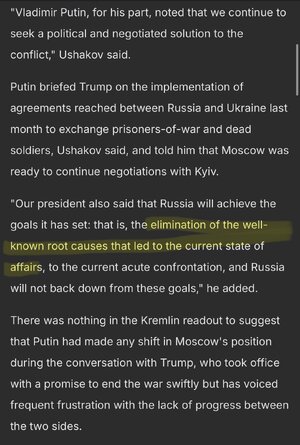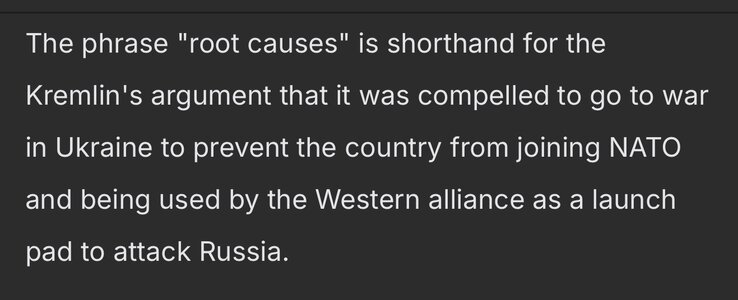Navigation
Install the app
How to install the app on iOS
Follow along with the video below to see how to install our site as a web app on your home screen.
Note: This feature may not be available in some browsers.
More options
You are using an out of date browser. It may not display this or other websites correctly.
You should upgrade or use an alternative browser.
You should upgrade or use an alternative browser.
Russia - Ukraine “peace negotiations”
- Thread starter nycfan
- Start date
- Replies: 4K
- Views: 176K
- Politics
- Messages
- 31,416
“This decision was made to put America’s interests first following a DOD review of our nation’s military support and assistance to other countries across the globe. The strength of the United States Armed Forces remains unquestioned — just ask Iran.”
- Messages
- 1,467
“This decision was made to put America’s interests first following a DOD review of our nation’s military support and assistance to other countries across the globe. The strength of the United States Armed Forces remains unquestioned — just ask Iran.”
A Bluesky link for the X averse ...
1moretimeagain
Inconceivable Member
- Messages
- 2,784
That’s true, Mike, but it would be a big win for Putin.
- Messages
- 3,240
That’s true, Mike, but it would be a big win for Putin.
and his wannabe buddy orangeturd
- Messages
- 2,961
So Trump halts shipment of previously committed weapons for Ukraine and today Russia pounds Ukraine's third largest city with ballistic missiles ?
Is it too early to declare peace is at hand ?
Funny they are speaking on the day that BBB passes. Me thinks we are about to see how far Trump is willing to go to hurt Ukraine.
- Messages
- 31,416
Putin Stands Firm On Ukraine, Tells Trump Iran Solution Should Be Diplomatic
Vladimir Putin told Donald Trump on a call that Moscow will not "give up" on its aims in Ukraine, while pledging it will also keep up a negotiating process on the conflict.

Putin Stands Firm On Ukraine, Tells Trump Iran Solution Should Be Diplomatic
Vladimir Putin told Donald Trump on a call that Moscow will not "give up" on its aims in Ukraine, while pledging it will also keep up a negotiating process on the conflict.
“… Russian President Vladimir Putin told US President Donald Trump in a phone call on Thursday that Moscow wants a negotiated end to the Ukraine war but will not step back from its original goals, a Kremlin aide said.
In a wide-ranging conversation that also covered Iran and the Middle East, Trump "again raised the issue of an early end to military action" in Ukraine, the aide, Yuri Ushakov, told reporters….


- Messages
- 2,961
Sounds like Putin told Trump how it's gonna go down in Ukraine. Russia gets anything and everything it is striving for which ( reading between the lines ) is the annexation of Ukraine into the Soviet orbit, and Ukraine gets Jack squat.Putin Stands Firm On Ukraine, Tells Trump Iran Solution Should Be Diplomatic
Vladimir Putin told Donald Trump on a call that Moscow will not "give up" on its aims in Ukraine, while pledging it will also keep up a negotiating process on the conflict.

Putin Stands Firm On Ukraine, Tells Trump Iran Solution Should Be Diplomatic
Vladimir Putin told Donald Trump on a call that Moscow will not "give up" on its aims in Ukraine, while pledging it will also keep up a negotiating process on the conflict.www.ndtv.com
“… Russian President Vladimir Putin told US President Donald Trump in a phone call on Thursday that Moscow wants a negotiated end to the Ukraine war but will not step back from its original goals, a Kremlin aide said.
In a wide-ranging conversation that also covered Iran and the Middle East, Trump "again raised the issue of an early end to military action" in Ukraine, the aide, Yuri Ushakov, told reporters….

I know we have joked about Trump being Putin's bitch, but now I'm starting to think Trump may really be Putin's bitch.
- Messages
- 31,416
“… The excuse offered with the leaks is that U.S. stockpiles of these arms are in short supply. But it’s no surprise that the stories also finger Elbridge Colby as the driver of the arms denial. He’s the Pentagon under secretary who has argued that the U.S. can’t arm Ukraine and defend U.S. interests. His chief patron in the White House is Vice President JD Vance and his outside cheerleader is Tucker Carlson.
…
But one clue about the real motive here is that the U.S. is withholding guided rockets that aren’t in such short supply. With Iran weakened militarily, there isn’t a more urgent need for more Patriots anywhere else in the world than in Ukraine. And if the cupboard is truly so depleted that America can’t support a friend in a hot war with a U.S. adversary, then that is a bigger national emergency.
The President would have a duty to explain that deficiency and lead an all-out national effort to expand U.S. military production, not hide behind news leaks pleading poverty. But instead Mr. Trump says the U.S. military has never been stronger.
Which is it, Mr. President—strongest ever, or a depleted arsenal?
…
Ukraine has already agreed to Mr. Trump’s cease-fire terms, and the way to peace isn’t to treat Ukraine as if it’s equally as responsible for the war as Russia. The way to end the war faster is to impose tougher sanctions and arm Ukraine further. But Mr. Trump has imposed no pressure for peace on Mr. Putin beyond plaintive social-media posts.
The latest arms decision against Ukraine looks like another signal to Mr. Putin to continue the war. And why not? He can keep banking territorial gains while Mr. Trump keeps begging the dictator, pretty please, for a truce.…”
So, "Putin stands firm on Ukraine."
He certainly acts like someone who is confidant that he has some cards left to play. Odd though, his summer offensive hasn't done much so far and he now says he plans to cut military spending next year. Perhaps he thinks he can win by then? By November 1 we should have a better picture of the true state of the war.
He certainly acts like someone who is confidant that he has some cards left to play. Odd though, his summer offensive hasn't done much so far and he now says he plans to cut military spending next year. Perhaps he thinks he can win by then? By November 1 we should have a better picture of the true state of the war.
Share:
